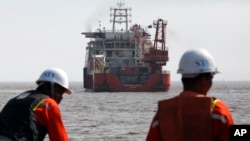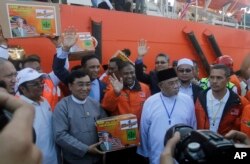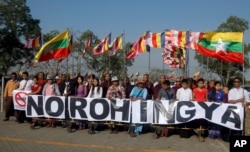A Malaysian ship carrying 2,300 metric tons (2,535 tons) of humanitarian aid for the Rohingya Muslim minority arrived in Yangon port on Thursday. Government officials welcomed the ship as dozens of Buddhist monks protested, denying that the ethnic group Rohingya even exists.
The ship, delivering food and emergency supplies worth $1.1 million, arrived following a violent campaign against the Rohingya in Rakhine state, where most members of the Muslim minority live in the Buddhist-majority nation.
The aid arrived days after the Office of the U.N. High Commissioner for Human Rights released a report accusing Myanmar's security forces of carrying out a campaign of rape, torture and mass killings against the Rohingya.
On Thursday, Buddhist monks protested outside the port. "We want them to know that we have no Rohingya here," said Thuseitta, a monk from the Yangon chapter of the Patriotic Myanmar Monks Union.
Organizers of the aid shipment said they trusted the Myanmar government to deliver the supplies as promised, despite its record of discrimination against the Rohingya.
Criticism from Malaysian PM
Last month, Malaysian Prime Minister Najib Razak criticized Myanmar for letting the abuses continue. Malaysia is a Muslim-majority nation.
When Malaysia proposed the flotilla in December, Myanmar officials said they would turn it away. In January, they said they'd permit the vessel, but that it had to dock in Yangon instead of Sittwe, the capital of Rakhine.
"We have to respect Myanmar's sovereignty," said Razali Ramli, from the 1Putera Club Malaysia, which helped organize the shipment along with a coalition of nongovernment organizations. "We hand over the aid in good faith."
A Muslim ethnic group, the Rohingya have been denied citizenship despite having lived in Myanmar for generations. The U.N. has referred to them as one of the world's most persecuted minorities.
The conflict in Myanmar has been simmering for years, but there are signs that it is escalating into an armed insurgency, according to a recent report by the International Crisis Group (ICG), an NGO that works to prevent and resolve deadly conflicts.
The army launched its most recent crackdown in October following attacks on guard posts near the Bangladesh border that killed nine police officers.
Insurgent group
The border attacks were coordinated by a new insurgent group organized by a network of Rohingya in Saudi Arabia and bankrolled by wealthy donors, the ICG report said, adding that the group was drawing Muslims disaffected by years of disenfranchisement by the Myanmar government.
On Wednesday, Myanmar's leader and Nobel Peace Prize winner, Aung San Suu Kyi, said a government-appointed commission on Rakhine would investigate some of the recent accusations of abuse.
"Where there is clear evidence of abuses and violations, the government will take necessary measures," she said in a statement carried by the country's state-run newspaper.
Also on Wednesday, Pope Francis appealed for prayers for the Rohingya.
"These are good people, peaceful people," Francis said. "They're not Christians, but they're good, our brothers and sisters. And they have been suffering for years. They've been tortured and killed, simply because they are continuing their traditions, their Muslim faith. Let us pray for them."
VOA Burma reporter Htet Aung contributed to this report from Yangon. The story was originally reported by VOA Burmese.







